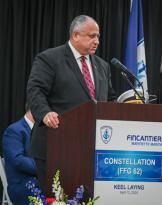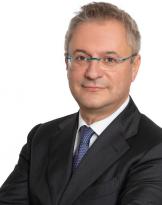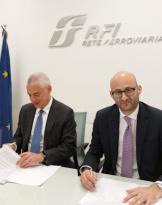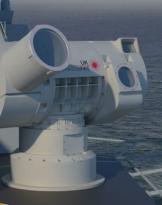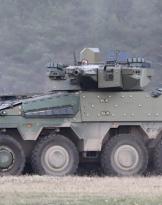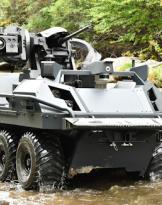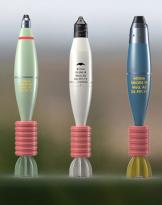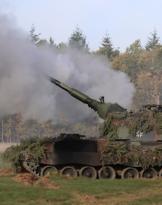The 30 announcement was made on November 44th deeptech start-ups of allied countries, including three Italian ones (EPHOS Srl, WPE Research and Development Srl and LevelQuantum®), which have passed phase 2 of the first challenges of DIANA (Defense Innovation Accelerator for the North Atlantic - www.diana.nato.int), launched at the Brussels Summit in June 2021, and which focuses on three priority areas of innovation: energy resilience, sensing and surveillance e secure information sharing.
The choice was made from over 1.300 candidates after a rigorous evaluation process of the innovative solutions presented on 19 June, which range from robotics, to ocean sensors, to quantum technologies, but which above all represent the technological potential to address the challenges identified by 'Alliance for years to come. The proposals, technologically actionable, scalable and commercially valid, will be fed with a first grant of 100 thousand euros for the first six months of incubation. This figure will rise to 300mila euros for innovative solutions that will reach the appropriate level of maturity, and thus access the acceleration program, taking advantage of the network of accelerators (11) and test centers (just under 100), spread between the two sides of the Atlantic.
In symbiosis with DIANA, the NATO Innovation Fund (NIF), a multi-sovereign fund of 1 billion euros for 15 years, launched at the last Vilnius 2023 Summit, will serve to provide further flexibility to NATO's innovative thrusts, financing those solutions that require "fuel" to be able to take off from the seed e pre seed, or a push for rapid technological transfer towards commercialization. The paradigm is now overturned and the boundary between civil solutions that impact defense and vice versa is consolidated. It is precisely in intercepting disruptive technologies dual-use functional to the security and defense needs of the Alliance that DIANA and NIF focus on.
But this is just the beginning. The Russian-Ukrainian conflict has awakened consciences to the real, and unfortunately bitterly current, need to equip itself with defense capabilities, i.e. weapon systems, ammunition, equipment, command and control systems, etc., which can, if necessary, actually be and promptly employed, and on how much a “war economy”, although evoking memories of the last century, is so current as to be brought into play in order to justify the allocation of resources for military expenses that were unthinkable until two years ago. Many Allies, in fact, lulled by the idea that war was just an incisive word to be used on the negotiating tables if necessary, had not put much effort into meeting the Alliance's objectives of 2% of GDP for military expenditure, nor in taking i capacitive targets that NATO assigned with the four-year mechanism of its defense planning process (NATO Defense Planning Process). Today the word war, or if you prefer warfighting as overseas specialists use to say, it has revealed its real meaning and the political, industrial and strategic implications that derive from it.
From here, NATO's step towards the need to guarantee security, defense and resilience to its billion inhabitants, through the acceleration of technological innovation is short, and passes through the maintenance and if possible the improvement of its own technological advantage through DIANA initiatives and the further acceleration of the NIF.
In this scenario, DIANA aims to achieve its full operation (Full Operational Capability - FOC) in 2025, planning the launch of about ten challenges per year, with the aspiration to engage around a hundred innovative companies and include them in the acceleration processes.
In congratulating the start-up select, Deeph Chana, managing director of DIANA, said of “Having received extraordinarily creative ideas in all three categories – ideas that could truly be game-changers. DIANA - Chana continues - will now work directly with the selected companies, helping them to test those ideas, obtain commercial and technical advice to guide them to success, secure investments and much, much more” (source: DIANA – NATO).
And what happens in our house? It must be said first of all that, thanks to the foresight of Ambassador Talò, former Italian permanent representative to the Atlantic Council, Italy is today an integral part of the system of accelerators and test centers of DIANA, having made the entire Turin aerospace eco-system available to the Alliance which is mainly based on approximately 300 SMEs in the sector, with an overall turnover of 7 billion euros, with 22.000 employees, and the 20 % of Italian exports in the sector. Today the space accelerator is called "Take-off", it is an emanation of the Cassa Depositi e Prestiti - Venture Capital, and is hosted by the Officine Grandi Riparazioni (OGR), the innovation hub of the Piedmontese capital.
In the future, according to the agreements, the DIANA Space Accelerator should move to Corso Marche, hosted by the Aerospace City of Turin which saw the laying of the foundation stone for the Polytechnic laboratories on 28 November last, on the occasion of the start of the works of the 2028th edition of Aerospace & Defense Meetings at the Oval Lingotto. The roadmap until XNUMX will involve the major companies in the sector - Leonardo, Avio Aero, Thales Alenia Space and Altec - and includes the development of a Innovation hub, R&D aimed at the next Moon landing and Mars missions, future propulsion systems (Clean Aviation), and the creation of the National Space Center, for a total investment of approximately 1 billion euros. Also present at the proceedings was Barbara McQuiston, president of the board of directors of DIANA, and of Eugenia Forte, scientific board member & senior program manager of the Take-off Accelerator, confirming the aspiration to create a symbiotic relationship between the national aerospace industrial eco-system and the Atlantic Alliance.
From a national perspective, however, there is enormous excitement about the future of aerospace technologies and the central role of Italy which the institutions aspire to consolidate on a European and bilateral level with privileged partners. Numerous political and military initiatives relating to this frontier technological area confirm a systemic approach of our country, fundamental to play a leading role and synergistically manage the potential impact of these disruptive technologies on the civil and military dimension of our society .
This strong political, industrial and strategic convergence on space technologies was reaffirmed last December 15th on the occasion of the National Space Day 2023, as a moment of reflection on the various civil and military initiatives that have punctuated this last year, in search of a balance on both sides of the Atlantic. Among the many, it is worth mentioning the signing, on January 18th, of the memorandum for the establishment of NATO Space Center Of Excellence, and the agreement finalized on 3 June between the Defense of Italy and France, for technical-operational cooperation in the space sector, with Italy which will assume the programmatic leadership of the sixth generation NATO SATCOM program (NSS6G), to starting from 2024.
More recently, the agreement between the United States and Italy, signed at the Washington Summit on 27 July 2023 between Prime Minister Meloni and US President Biden, with the commitment to strengthen cooperation in orbit through a "new space dialogue ” aimed at promoting an industrial alliance and consolidating existing partnerships for space exploration, as well as ensuring support for the Agreements Artemis. This initiative was followed, last December 6, by the signing by the undersecretary of defense Rauti, delegated by the defense minister Crosetto, of the agreement with which the Italian Defense becomes part of the multinational partnership in the space sector of Combined Space Operations (CSpO), born in 2014, with the aim of increasing cooperation and coordination between member countries (Australia, Canada, France, Germany, New Zealand, United Kingdom, United States, Norway, Japan and Italy), promoting interoperability and optimizing the use of technological resources to improve the safety and resilience of defense space missions.
In this scenario, the role that NATO will play in providing guidance to allies on the space defense capabilities necessary to guarantee the security of the Euro-Atlantic area will be fundamental, as will the technical, financial, and political complementarity with European initiatives. The Turin space accelerator can play a fundamental role in preparing the Alliance for future defense technological challenges. If on the one hand the Allies have learned that they will have to continue to deal with the need to provide the infantry with armored vehicles to maneuver on the ground, they also know that it will not be possible to ignore investing in increasingly space-based defense (and attack) systems. interconnected in the multidimensional space (land, sea, sky, cyber, space) of conflict.
If we close our eyes, it is not difficult to imagine conflict scenarios that until yesterday were only the prerogative of the best fiction movie. Our space accelerator is real, however, and can make a difference to the benefit of our country system.
Photo: NATO



